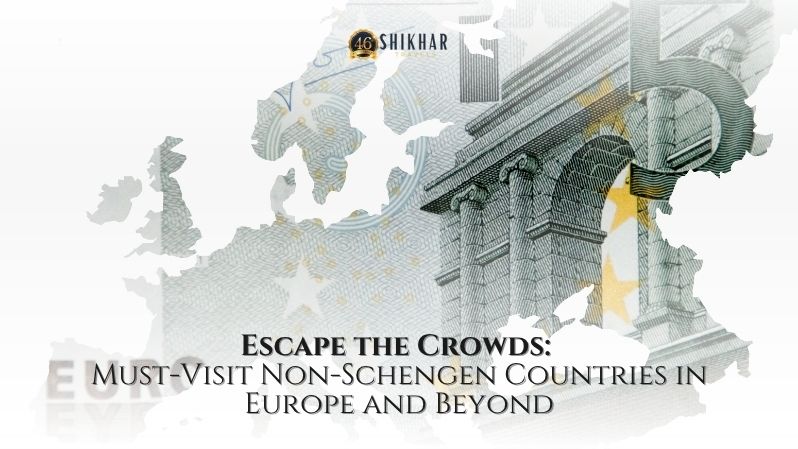Escape the Crowds: Must-Visit Non-Schengen Countries in Europe and Beyond
Europe’s true soul often whispers loudest beyond the Schengen Area’s streamlined borders—in nations fiercely protective of their distinct rhythms, where visas aren’t bureaucratic hurdles but invitations to deeper engagement. These non-Schengen realms—from Balkan highlands to Arctic microstates—reject continental homogenization, offering travellers not just destinations but dialogues with resilience. Here, cultural integrity outweighs convenience, and the journey begins with understanding boundaries as sacred spaces worth crossing with intention.
Sovereignty as Sanctuary: Nations Writing Their Own Narratives
The United Kingdom’s impending 2025 Electronic Travel Authorization (ETA) system exemplifies this deliberate divergence—a calibrated response to preserve public services amid record tourism. Similarly, Moldova maintains rigorous 90/180-day stays despite its small size, signalling that sovereignty trumps tourist volume. These policies aren’t barriers but filters ensuring visitors arrive prepared to engage meaningfully. According to Atlys, Albania’s astonishing 365-day visa-free access for Americans stands as radical hospitality—a nation confident enough to let travellers immerse in its Ottoman ruins and Ionian coasts without bureaucratic friction.
Cartographies of Contemplation: Escaping the Algorithmic Gaze
While Instagram crowds swarm Prague and Paris, alternative geographies offer sanctuary:
- Albania’s Riviera: Where the 1,000 Lekë (₹750) waterfront seafood feast in Himarë contrasts with Mykonos’ €100 plates, and ceramic-blue waters mirror abandoned Cold War bunkers—a landscape where history and hedonism collide.
- Georgia’s Tusheti Highlands: Accessible only summer months via 4×4 tracks, this UNESCO-protected region shelters stone watchtowers and shepherds fermenting kvevri wine in clay amphorae. Tbilisi’s urban energy gives way to trails where wolves outnumber hikers.
- Montenegro’s Bay of Kotor: Venetian palazzos backdropped by Dinaric Alps host jazz festivals in lieu of cruise crowds—best experienced via kayak at dawn when fjord mists swallow sound.
Check here International Tour Packages: International Vacation Package
Table: Visa Nuances & Temporal Sweet Spots
| Destination | Visa Policy | Crowd-Lite Seasons | Cultural Catalyst |
| Albania | 1 yr visa-free (US) 11 | May; September-October | Ottoman-Greek fusion cuisine |
| Georgia | 365 days visa-free (US/IN) 14 | April-June | Polyphonic singing traditions |
| Bosnia-Herzegovina | 90/180 days 11 | Late autumn | Coexistence mosques/churches in Mostar |
| Åland Islands | 90 days via Schengen transit 11 | August | Swedish-speaking mar |
The Architecture of Access: Visa Strategies as Rituals
Crossing these thresholds demands cultural homework:
- Bosnia’s 48-Hour Registration: Staying privately? Your host must register you at local police stations—a practice preventing informal housing exploitation while fostering community accountability.
- Cyprus’ ETIAS Prep: Mid-2025 requires pre-approved European travel authorization, urging travelers to apply early through official portals to avoid last-minute denials.
- Serbia’s Private Stay Protocol: Even visa-exempt visitors must register at police stations within 24 hours if not in hotels—a measure combating illegal migration while inviting guests into civic systems.
These aren’t hoops but handshakes: agreements that travellers respect local governance as part of the exchange.
The Deeper Currency: Why Boundaries Enrich Encounter
In Georgia, supras (feasts) stretch for hours because the absence of mass tourism preserves unhurried hospitality. In Moldova, wine cellars like Cricova remain crowd-free because visa limits prioritize connoisseurs over crowds. The very constraints shaping access to these nations—whether Albania’s requirement for prior Schengen visas from Indians or Britain’s ETA—curate communities of travellers invested beyond photo ops. One leaves not just with souvenirs but with the humility of having been allowed in.
Epilogue: The Wisdom of Walls
To travel Non-Schengen countres, try Atlys for Visa approval. To travel beyond Schengen isn’t a rejection of Europe’s unity but a recognition that meaning flourishes in particularity. These sovereign spaces—guarding linguistic quirks, culinary secrets, and registration rituals—remind us that friction can forge connections. They ask: Will you meet us on our terms? Those who answer “yes” discover Albania’s coastline without beach clubs, Georgia’s mountains without gondolas, and Britain’s moors without queues. Here, the “undiscovered” isn’t a marketing myth—it’s a pact between place and pilgrim to protect the sacredness of encounter. In choosing the road less streamlined, we find not escape, but arrival.
